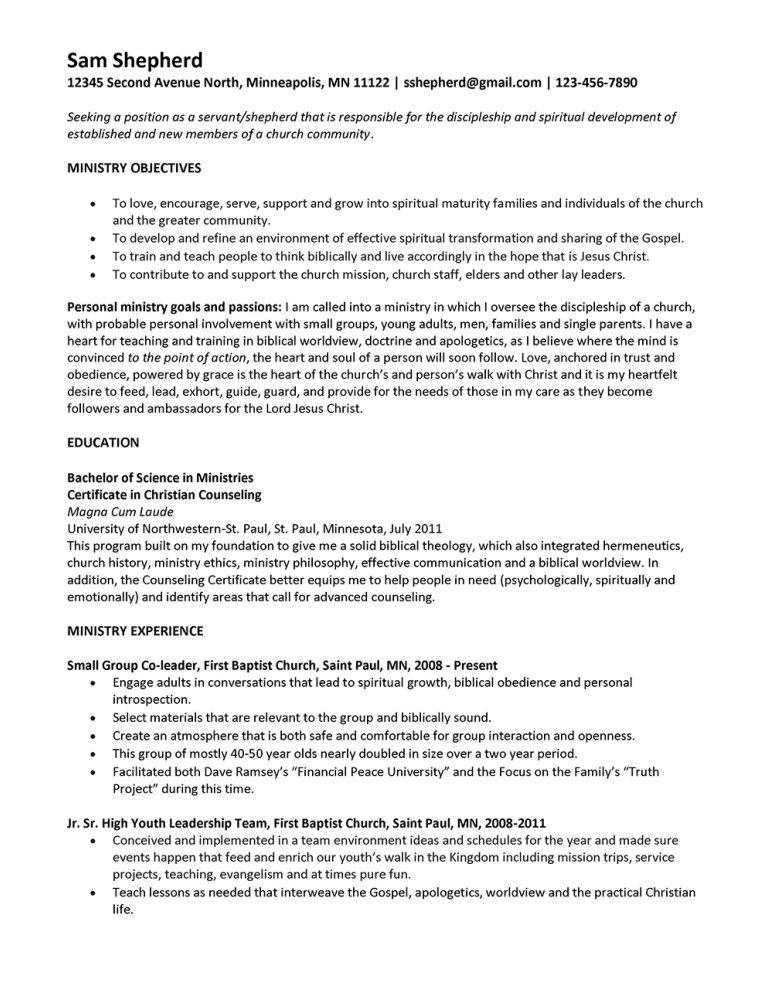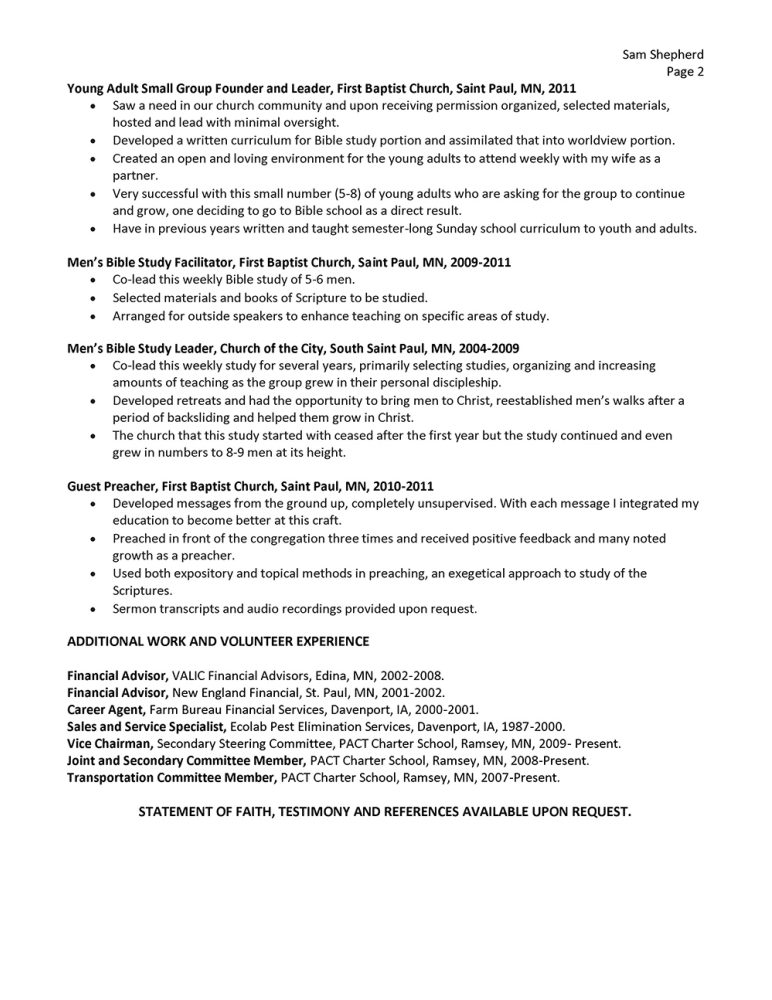What makes a ministry resume different?
A well written ministry resume reflects your preparation for ministry, your philosophy of ministry, your practice of ministry, and your passion for ministry. When it comes into the hands of a search committee it is likely to be thoroughly read (not just skimmed), studied, pondered over and discussed by the group. A ministry resume gives a the committee an in depth view of where you have been and what you are like. It tends to be longer, more personal, and more detailed than a traditional “business-focused” resume.
Like all resumes, a ministry resume summarizes your experiences and qualifications as they relate to the job you seek. To be most effective, your resume must be focused on the position and how you can meet the needs of the ministry. It should tell the readers who you are, what you know, what you have done and what you bring to the work of the ministry. It should help the search committee evaluate how well you align with the job and the mission and vision of the ministry.
Because a resume is a reflection of an individual, there is no one perfect way to approach writing one. However, there are some basic guidelines to follow and common mistakes to avoid. If you are pursuing a position in more than one field (perhaps church vs. parachurch ministry), you will probably need more than one version of your resume. You may also want to have a career counselor and a professional in your field(s) of interest critique your resume. In the end, you will want to make strategic choices about what to say on your resume and how to say it, so that your resume will be uniquely you.
Before Starting Your Resume
Spend some time reflecting on the past
- How do you know you are called to the ministry?
- What life experiences have prepared you for ministry? What have you learned along the way? Where have you had success? Where have you been challenged, and persisted until you overcame?
- You will need to have a thorough understanding of your experiences and the skills they represent in order to write a quality resume. Jumping to writing too quickly makes it easy to stop thinking about how you will demonstrate that you are ready to serve in professional ministry.
- You’ll need to be able to articulate how your experiences have prepared you for the job you seek. You’ll have to do this on the resume, and also to a greater extent in interviews.
Spend some time pondering the future
- What do you hope to accomplish in ministry in general?
- What is your philosophy of ministry?
- How do you fit with the mission and vision of the ministry you are applying to work with?
- What excites you about ministry in general, and about this position in particular?
Writing Your Resume
Content: Content is more important than format! The reader has to walk away from your resume with a clear picture of how your past experiences have prepared you for the ministry role you seek. Success in the past is an indicator of future performance. The most relevant information should be listed first; more relevant experiences should also have greater detail than less relevant ones. Here are some content guidelines:
- Make certain your contact information is complete, accurate, and current. Contact information should be placed at the top of the resume. Use only one address, phone number, and email. Including a picture is optional.
- Include a ministry objective (what you hope to accomplish) and/or personal ministry goals underneath the contact information. The reader wants to know what you are called to and what motivates you in ministry.
- List relevant information about your educational background in reverse chronological order. You can include descriptions of relevant coursework, but don’t just list classes.
- Accentuate qualifications (gifts, skills, experience, accomplishments) relevant to the ministry role for which you wish to be considered.
- Not everything you have done is relevant. Put the most related and significant experiences first. Don’t spend a lot of time or space on experiences or skills that are less relevant to the ministry context.
- Unpaid ministry experiences may be worthy of inclusion on a resume. Any experience where you have had an opportunity to practice an aspect ministry is worth considering as resume content— whether or not you were paid to do it.
- List experiences in a way that demonstrates what you have done and can do in ministry. Describe what you did, how you did it, who you did it for, and what outcomes occurred as a result.
Formatting: Your goal is to organize information so that it is clear and comprehensive, yet concise, orderly, easy to read, visually appealing, grammatically correct, and professional in appearance. Consider these points when making formatting decisions:
- Be consistent in the use of spacing, highlighting, punctuation, and style.
- Emphasize important items using capitalization, underlining, bolding, italicization, or bullets.
- You may find it more effective to communicate in short summary phrases instead of complete sentences.
- Determine how you want to divide information and title each section appropriately. This will make the organization of your resume immediately clear to the reader.
- Use attractive font styles of readable size.
- Allow plenty of space between sections and in margins, to avoid a cluttered look.
- Use action words, active language, and proper verb tense in describing experience.
- Carefully proofread (at least three times) to eliminate any spelling, grammatical, typographical, and punctuation errors. When errors are present it can signal a lack of attention to detail.
Sample Ministry Resume






